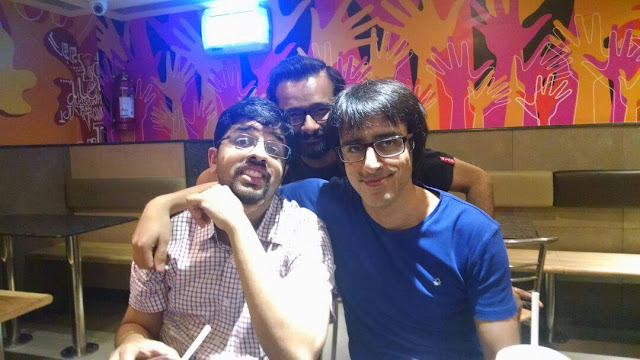Ashish Yechury Could Empathize Like Few Could
 |
| Sameer Arshad Khatlani Follow on Facebook |
I got my fingers burnt very early after my arrival in Delhi in 2004 to understand that pouring one’s heart on issues such as Kashmir was a bad idea. Anything that did not fit into the national narrative and tried to shed light on the 99.99% sufferers of the conflict in Kashmir, essentially triggered by the denial of share in power and resources to them, had consequences. From cold vibes to isolation and even physical harm, the potential and real costs taught me the virtues of nuance. I tried to give a nuanced view of Kashmir to anyone who seemed interested until I stopped talking about it altogether in 2010, which was a turning point in my life and offered me a reality check of the world around me. At least 120 people, including teenagers and kids, were shot dead in a matter of few months in firings on protest marches that year. The protests were triggered after a tear gas canister hit a 17-year-old aspiring doctor’s skull and killed him instantly. On a day when a seven-year-old boy, whose family I met a few months later in 2010, was shot in his chest and killed, a particularly toxic television news anchor was baying for more blood. The boy was not even a footnote in that day’s media coverage.
ALSO READ: Cross-Border Covid Solidarity Won't Alter Paradigm Of India-Pak Ties
ALSO READ: Sarkari Mussalmans And The Art of Keeping Heads Deeply Buried In The Sand
ALSO READ: Why Guru Nanak's Legacy Is More Relevant Than Ever Before
Ashish and I grew closer when he joined our team sometime in 2013. He began to join me for walks on the service lane of Bahadur Shah Zafar Marg, India's Fleet Street. We spent hours chatting over cups of tea and coffee at the Udupi Café and later a Macdonald's outlet. Talking to Ashish was often like a weight off my shoulders. I could give up my political correctness and speak my mind thanks to a deep sense of empathy that Ashish personified. His ability to be empathetic was unique for the people of his background. An alumnus of an elite school and college in Delhi, Ashish came from an illustrious background; a family of bureaucrats and well-known academics. Yet his simplicity and ability to connect with people of all backgrounds were striking.
ALSO READ: Ignorance About It Is Biggest Crisis Islam Faces
ALSO READ: What Does 'Muslim Appeasement' Really Mean?
I really understood the meaning of what I would often hear about the ideological commitment of the communists after getting to know Ashish. His frugality was a far cry from the lifestyle associated with children of politicians. Ashish did not even own a car or for that matter anything. He would come drenched in sweat to the office in sweltering summer months as he would walk all the way from the nearest Metro station over a kilometre away. In a country, where even small-time politicians live a king-size life, it was difficult to imagine his father, Sitaram Yechury, is one of India’s most prominent former lawmakers and head of one of its biggest political parties (Communist Party of India-Marxist).
ALSO READ: Pope’s Visit To Iraq A Reminder Of How More Unites Than Divides Religions
The shoulder I would cry on went too soon. Ashish lost his battle to coronavirus on April 22 weeks short of his 35th birthday. Ashish is among several friends, colleagues, and acquittances, who have died in recent weeks, as the second wave of the virus has infected millions in India, overwhelmed its underfunded health care system and triggered a shortage of medicines and oxygen. As I write this, a colleague is battling for her life on oxygen support after managing to get a hospital bed at a small suburban hospital, around 50 km from where she lives. Almost everyone in my apartment building is infected and struggling to get medical care. So many of our friends, near and dear ones have lost close family members. It seems like the Kashmir of the 1990s when everyone appeared to be in mourning, hardly anyone remained untouched or did not lose a family member, friend, relative, neighbour, or acquaintance. I see the same helplessness, but with a silver lining that no one is rejoicing the misery of others for the pandemic has been a great leveller, and will hopefully make many more of us as empathetic as Ashish was.
Khatlani has reported from Iraq and Pakistan and covered elections and national disasters. He received a master’s degree in History from the prestigious Jamia Millia Islamia University in New Delhi. Khatlani is a fellow with Hawaii-based American East-West Center established by the US Congress in 1960 to promote better relations and understanding with Asian, and Pacific countries through cooperative study, research, and dialogue.
Penguin published Khatlani’s first book The Other Side of the Divide: A Journey into the Heart of Pakistan in February 2020. Eminent academic and King’s college professor, Christophe Jaffrelot, has called the book ‘an erudite historical account... [that] offers a comprehensive portrait of Pakistan, including the role of the army and religion—not only Islam’.
 |
| To buy click here |






Moving account. May his soul rest in peace.
ReplyDeleteHe went too soon. May his soul rest in peace.
ReplyDeleteA heart felt writing. Got know Mr Asish from your column than any other had offered earlier. Sorry your loss.
ReplyDelete